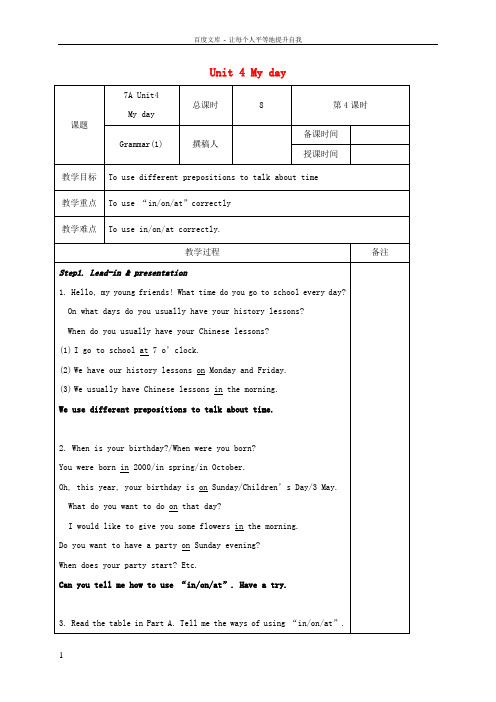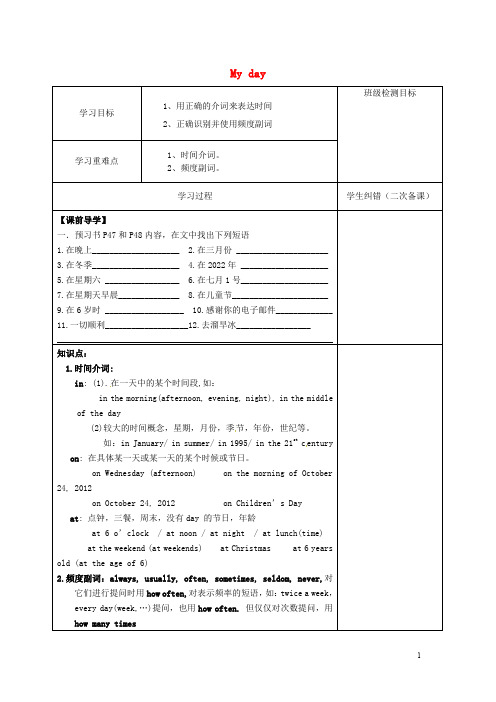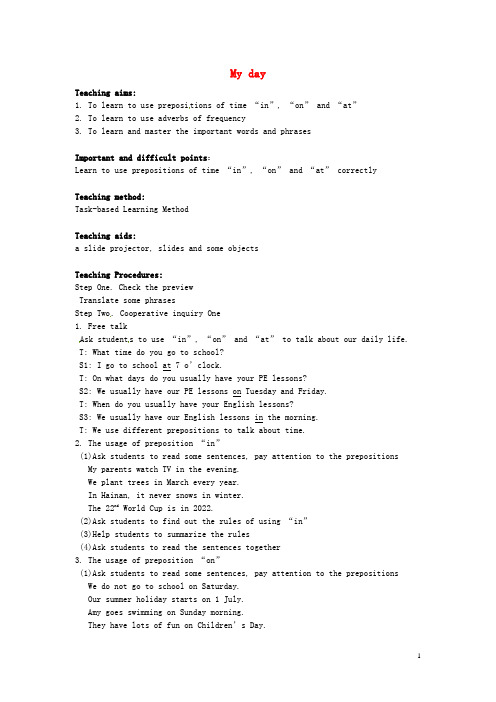七年级英语上册 Unit 4 My day Grammar I学案新牛津版
七年级英语上册Unit4MydayGrammarI导学案新牛津版

Un it 4 Grammar I班级: ______________ 姓名: _____________________________________【课时导航】一.翻译下列短语。
1. 在六点 _ ____________________2.在夜晚 ____________________3. ________________________ 在 2012 年 10 月_______________________4. _______________ 在 10 月 1 号 _________________ ____________ __________________________5. __________________ 在星期六 _________________________6. __ 在星期天早晨 _______________________ _7.擅长踢足球 _______________ 8 __________ 玩得开心 _______________ __________ ____________ 9.喜爱体育运动 ____________________________ 10.溜旱冰 ________________ _【实战演练】•单项选择。
( )9.--- ______ does she go swimmi ng? ——Sometimes, on Sun day.A. How longB. How ofte nC. Wha tD. How soon()10. ---Whe n do you play football at school?—— ___________ .A. For an hourB. Every dayC. At 4 in the afternoon .用on, in 和at 填空。
1. I like swimmi ng _____ s ummer.2. The children have lots of fun _____ C hildren ' s Day.3. I was born _____ October 10,2000.4. My father ofte n reads n ewspapers _____ the morning.5. T he girl was born ______ a cold win ter morning.6. We don' t go to school ______ Sun day.( ( ( ( )1. The stude nts in our class lik A. on B. for C. after )2.My gra ndmother usually ______ Sun days.e play ing games ___________ the playgro und.D. undergoes to bed ___________ 8:30 _________ theA. in; at; onB. at; in; onC. in; on; atD. at; on; in)3. - Are those students your classmates?- Yes, __________ are my classmates. I often play with ____________ .A. they; theyB. them; theyC. they; themD. them; their)4. We usually play basketball __________ Thursday after noon.A. inB. atC. onD. /( )5. My father usually likes sitti ng on the sofa and ___________ TV after work.A. to watch )6. The meeti ng is __ A. inB. onC. at B. watch ing C. watchD. watch _ themorni ng.D. fromeve ning )7. He started lear n A. to B. for C. at ing French __ 15th May.D. on)8 .I don A. never t like swimmi ng at all. I ____ go swimmi ng.B. seldomC. ofte nD. some timesD. In the playgro und7. My birthday is _______ A pril 1st.8. We' re going to see the doctor _______ f our o ' clock.9. He ofte n takes Eddie for a walk ____ the evening.10. They have a long holiday ____ November.11. He was born _____ 1992.12. He likes readi ng n ewspapers ____ breakfast.13. She starts learning English ___ 6 o ' clock.14.lt ' s cold ________ winter in China.15. They play the game ________ the evening of 31st October.【拓展延伸】一•根据所给首字母或汉语写出句中所缺单词。
七年级英语上册Unit4MydayGrammar导学案(无答案)(新版)牛津版

Unit 4 My day一、【学习目标】:1、用正确的介词表达时间。
2、正确识别并使用频度副词。
二、【学习重难点】:正确识别并使用频度副词。
三、【自主学习】:翻译词语:1、对。
有好处2、在儿童节那天3、做太多的作业4、告诉你我的生活5、每周去一次俱乐部6、跳舞半小时7、去溜旱冰 8、祝你好运9、想要。
愿意 10、为。
做准备四、【合作探究】:1.与学生进行交流,导入本课内容。
2.鼓励学生将生活作息时间写成句子(写在黑板上)3.教师用彩色粉笔将句子中的on in at标出来。
向学生呈现语法:We use different prepositions to talk about time .4. 出示日历,通过对话启发他们思考介词的更多用法。
5.鼓励学生大声朗读例句,教师说:Let’s read the examples together.6.鼓励学生完成课本A 部分的练习。
7.全班朗读短文。
8.向学生介绍课本B部分的情景,指导他们完成练习。
9.让学生根据自己的实际情况编写对话,介绍自己的校园生活。
五、【达标巩固】:用适当的介词完成句子。
1.We talked about ita cold morning.2.Do you often listrn to the radiobreakfast?3.Shall we go to yhe cinema six o’clock the evening?4.Primary school students have two classes Wednesday afternoon.5.Eric is an English boy , but he came to Chinathe age of five.6.----Millie ,were you born 1990?----No, I was born 4th September ,1992.7.----Doyou like summer.Lily?-----Yes, I do . Because I can go swimming summer.8.----The meeting will be held 8:00 a .m-----Oh,it is 7:55now. Let’s go !。
七年级英语上册 Unit 4My dayGrammar导学案新牛津版

Unit 4 My day学生姓名__________________ 家长签名_______________【课前预习】预习目标:1. 了解时间介词in, on ,at 的用法:2. 学会用频率副词来询问日常活动。
◆3.仔细预习课文P:118-119页,一定别忘了哟!★基本词汇1.年龄age(复数)ages 2.生活,生命life(复数)lives★去仔细读读课文P:47-48页,掌握下列词组。
1植树plant trees 2第二十二届世界杯 the 22nd World Cup 3暑假summer holiday4在星期天早晨/下午/晚上 on Sunday morning/afternoon/evening5在儿童节on Children’s Day 6在六岁(2)at six(years old), at the age of six 7给---写回信write back to 8想要某物would like sth, 9在秋天in autumn10玩得很高心have great fun 11有许多时间做某事have much time to do sth12舞蹈课dancing lassons 13.去溜旱冰go roller skatingin, on ,at的用法。
去课本P47仔细找一找哦!★We use ‘in’ when we talk about _____________,________,_______ and___________如:在早上 /晚上___________________在二月份____________在十二月_______________ 在春天_______________在秋天________________在2010年_____________在1995年_________________★We use ‘on’when we talk about_______,______,_____________and___________ .如: 在星期天___________________在十一月三十日___________________在星期一下午_____________在一个冬天的早晨_________________________☆在十月三十一日的晚上_______________★We use ‘at’ when we talk about __________, ____________.如:在8:45_______________ 在早饭时_____________在13岁的时候_____________________ _________________________二、我们可以使用 _____ 副词来表示做某件事的______。
牛津译林版英语七年级上册unit4 my day grammar 学案

Unit4Grammar【学习目标】1.能记住并能运用下列单词和短语:would,would like,life,roller skating。
2.学会运用正确的介词来表达时间;正确识别并使用频度副词。
3.通过学习,能够用正确的语言与他人交流自己的作息情况。
◉课时重点:学会运用正确的介词来表达时间;正确识别并使用频度副词。
【预习导学】一、选一选1.I to tell you about my life here.2.My parents watch TV the evening.3.Our summer holiday starts1st July.lie has breakfast seven o'clock.lie often goes.6.What is your school like?二、译一译1.在海南,冬天从来不下雪。
______________________________________________________________2.第22届世界杯在2022年举办。
______________________________________________________________3.他们在儿童节玩得很高兴。
______________________________________________________________4.中国的孩子在六岁开始上学。
______________________________________________________________5.我和我的朋友们那时总是很高兴。
______________________________________________________________6.他们多久锻炼一次?______________________________________________________________三、想一想时间介词用法总结:根据上面的句子来看,在某个季节、某年、上午、下午、晚上,用介词;在某一天用介词;在几点钟、几岁用介词。
牛津译林版英语七上Unit 4《My day》(Grammar)教学设计

牛津译林版英语七上Unit 4《My day》(Grammar)教学设计一. 教材分析牛津译林版英语七上Unit 4《My day》主要讲述了一天中的日常活动。
本节课的主要内容包括一般过去时和一般现在时的区别以及如何运用这些时态来描述过去和现在的日常活动。
本节课的语言点是一般过去时和一般现在时的构成以及如何运用它们来构建句子。
教材通过丰富的语境和实用的日常对话,帮助学生理解和掌握这些语法知识。
二. 学情分析学生在学习本节课之前,已经掌握了一般现在时和一般过去时的基本知识,但可能对它们的运用还不够熟练。
此外,学生可能对一天中的日常活动有一定的了解,但需要通过课堂学习来进一步丰富和巩固这一知识体系。
因此,在教学过程中,教师需要关注学生的个体差异,因材施教,引导他们通过实践和交流来提高语言运用能力。
三. 教学目标1.知识目标:–能准确运用一般过去时和一般现在时描述自己的日常活动。
–理解一般过去时和一般现在时的区别,并能在适当的情境中运用。
2.能力目标:–能用英语进行简单的日常交流,提高口语表达能力。
–能通过听、说、读、写等多种方式,掌握和运用本节课的语言点。
3.情感目标:–培养学生对英语学习的兴趣,激发他们积极学习英语的激情。
–培养学生互相合作、积极交流的良好学习氛围。
四. 教学重难点•掌握一般过去时和一般现在时的构成和运用。
•学会用一般过去时和一般现在时描述自己的日常活动。
•一般过去时和一般现在时的区别及运用。
•如何在实际情境中灵活运用一般过去时和一般现在时。
五. 教学方法1.情境教学法:通过设定真实、生动的情境,让学生在实际语境中学习、运用英语。
2.交际法:引导学生进行互动交流,提高他们的口语表达能力和实际运用能力。
3.任务型教学法:通过完成各种任务,激发学生的学习兴趣,培养他们的合作精神。
4.游戏教学法:通过设计有趣的游戏,让学生在轻松愉快的氛围中学习英语。
六. 教学准备1.教学材料:教材、PPT、黑板、教学卡片、录音机等。
2016_2017学年七年级英语上册Unit4MydayGrammar教案新版牛津版

(6)How old do children in our city start learning English?
(7)When do you do your morning exercises?
2.Fill in the blanks.
(5)Ihope my dream can come true ________ 25.
3.Tommy is writing back to Millie to introduce his school life. Help him complete his email with correct prepositions of time. (Part A)
What do you want to doonthat day?
Iwould like to give you some flowersinthe morning.
Do you want to have a partyonSunday evening?
When does your party start?Etc.
When do you usually have your Chinese lessons?
(1)Iour history lessonsonMonday and Friday.
(3)We usually have Chinese lessonsinthe morning.
(1)Eric’s birthday is______6 December.
(2)The Open Day is ______Tuesday.
(3)Iwant to play tennis with Simon ______ three o’clock ______ the afternoon.
七年级英语上册 Unit 4 My day Grammar学案新牛津版

如:in January/ in summer/ in 1995/ in the 21stc entury
on:在具体某一天或某一天的某个时候或节日。
on Wednesday (afternoon) on the morning of October 24, 2012
on October 24, 2012 on Children’s Day
at:点钟,三餐,周末,没有day的节日,年龄
at 6 o’clock / at noon / at night / at lunch(time)
at the weekend (at weekends) at Christmas at 6 years old (at the age of 6)
Y: Thanks for your valuable suggestions.
F: You’re welcome.
一、当堂检测
根据所给的提示完成下列单词。
1. I can not _____________(想象) how my life will be without your help.
2.Can you give me some ___________(宝贵的) advice?
3.在冬季____________________ 4.在2022年____________________
5.在星期六_________________ 6.在七月1号____________________
7.在星期天早晨______________ 8.在儿童节______________________
Task 3. Summary
Name
七年级英语上册 Unit 4 My day Grammar学案(无答案)(新版)牛津版

My Day一.学习目标1.预习Grammar部分所有的单词2.预习本课时内容,并完成课本p47-48习题。
二.重点难点掌握介词的用法:(1)in 用在表示“月份”,“年份”,“季节”,“上午/下午/晚上”等词的前面。
(2)on用在表示具体某一天或某一天的早,中,晚,或表示星期几前(3)at用在表示某时间或某时刻的词前三.自学交流Ⅰ.翻译词组。
1.in winter ______________2.pla nt trees ______________3.on Saturday ______________4.on Children’s Day ______________5. at seven o’clock ______________6. on Sunday morning ______________Ⅱ.重点句型:1. Sandy doesn’t have much time to play tennis. Sandy没有很多的时间打网球。
2. I would like to tell you about my life here. 我想告诉你我这儿的生活。
3. Kitty goes to her dancing lessons every day. Kitty每天都去上舞蹈课。
4. Millie sometimes goes roller skating. Millie有时去溜旱冰。
5. I often play football with my friends on Saturday afternoon.我经常在星期六下去和我的朋友们踢足球。
6. The 22nd World Cup is in 2022. 第二十二届世界杯在2022年。
7. They have lots of fun on Children’s Day. 他们在儿童节当天玩得很开心。
8. Children in China start school at 6 years old. 中国的孩子们在六岁开始上学。
2019-2020学年七年级英语上册Unit4MydayGrammar教案新版牛津版 .doc

集备部分
课题
7A Unit 4 Grammar
中心发言人
时间
Teaching Aims:
e correct prepositions to express the time, week, month and season.
3.Draw the following pictures for the students to understand the adverbs.
never seldom sometimes often usually always
4.Explain the meanings of different adverbs of frequency. Get the students to look at Part A on Page 47. Give some time for the Ss to understand the words’ meanings.
2. My birthday is _______ April 1st.
3. We’re going to see the doctor_______ four o’clock.
4. He often takes Eddie for a walk _____ the evening.
5. They have a long holiday______ November.
2.Choose some sentences like:
She doesn’t play computer games. (Teachnever)
He goes to his grandmother’s home once a year. (Teachseldom)
七年级英语上册 Unit 4 My day Grammar教案 (新版)牛

Unit 4 My dayGrammarI. Teaching aims and learning objectivesBy the end of the lesson, students should be able to:1. use prepositions to talk about time correctly;2. use the adverbs of frequency correctly;3. grasp the usage of ‘how often’;4. use these items of grammar to talk about their daily life;II. Teaching contents1. New words and phrases: would, would like, life, all the best, roller skating2. New structure: How often do they exercise?III. Focus of the lesson and predicted area of difficultyKnow better about some usages of the prepositions of time.Tell the difference between ‘how often’ and “how many times”.IV. Teaching proceduresA Prepositions of timeStep 1 Presentation1. Find out the phrases which should be put after ‘in/ on/ at’ one by oneT: Hello, boys and girls. This is our school. We know a lot about it. Today, there will be a lot ofnew students coming here. Will you help them find their classroom? Here they come. And we have three classes. They are “in”, “on” and “at”. Shal l we begin?2. Read the phrases together3. Find out more similar phrases4. Work out the rules(1)in: in the evening (parts of day), in March (months), in 2013 (years), in winter(reason)(2)on Sunday, on December 31st(days & dates), on the evening of July 4th, on Mondayafternoon (parts of a specific day), on Children’s Day (specific holidays or days)(3)at seven, at noon, at lunchtime (time of day), at (the age of) 16 (age), atthe Spring Festival (specific holidays or festivals), at the weekend (others) 【设计意图】通过设计新生找教室的情境,让本来枯燥的语法稍显活泼些。
七年级英语上册Unit 4 My day Grammar教案 新版牛津版

My dayTeaching aims:1. To learn to use preposi tions of time “in”, “on” and “at”2. To learn to use adverbs of frequency3. To learn and master the important words and phrasesImportant and difficult points:Learn to use prepositions of time “in”, “on” and “at” correctlyTeaching method:Task-based Learning MethodTeaching aids:a slide projector, slides and some objectsTeaching Procedures:Step One. Check the previewTranslate some phrasesStep Two. Cooperative inquiry One1. Free talkAsk student s to use “in”, “on” and “at” to talk about our daily life. T: What time do you go to school?S1: I go to school at 7 o’clock.T: On what days do you usually have your PE lessons?S2: We usually have our PE lessons on Tuesday and Friday.T: When do you usually have your English lessons?S3: We usually have our English lessons in the morning.T: We use different prepositions to talk about time.2. The usage of preposition “in”(1)Ask students to read some sentences, pay attention to the prepositionsMy parents watch TV in the evening.We plant trees in March every year.In Hainan, it never snows in winter.The 22nd World Cup is in 2022.(2)Ask students to find out the rules of using “in”(3)Help students to summarize the rules(4)Ask students to read the sentences together3. The usage of preposition “on”(1)Ask students to read some sentences, pay attention to the prepositionsWe do not go to school on Saturday.Our summer holiday starts on 1 July.Amy goes swimming on Sunday morning.They have lots of fun on Children’s Day.(2)Ask students to find out the rules of using “on”(3)Help students to summarize the rules(4)Ask students to read the sentences together4. The usage of preposition “at”(1)Ask students to read some sentences, pay attention to the prepositionsMillie has breakfast at seven o’clock.At lunchtime, he always chat with his friends.They will go to England for a holiday at Christmas.Children in China start school at 6 years old.(2)Ask students to find out the rules of using “at”(3)Help students to summarize the rules(4)Ask students to read the sentences togetherStep Three. Cooperative inquiry Two1. Free talkT: Tommy and Mille often chat with each other on the Internet.Do you often chat on the In ternet?S1: Yes, I do. I chat with my friends on the Internet every day.T: You chat with your friends on the Internet every day. So you always chat with your friends on the Internet.S2: No, I don’t. I only chat on the Internet on Sundays.T: You only chat on the Internet on Sundays. So you sometimes chat on the Internet.T: Adverbs of frequency tell you how often things happen. There are some adverbs of frequency, such as never, seldom, sometimes, often, usually, always.2. Ask students to read the pictures in Part B by themselves3. Divide students into eight groups and try to find out the rules4. Ask a student from each group to summarize the rules5. Help students to summarize the rules(1)always>usually>often>sometimes>se ldom>never(2)We put an adverb of frequency before a verb except when the verb is to be.(3)When we ask questions, we use “how often”.Step Four. Personalized displayOur lessons begin __________ nine o’clock. Usually we have three lessons__________ the morning and two __________ the afternoon. We do not have lessons e2. Complete the exercises in Part B(1) Simon loves playing football. He __________ plays football in the playground.(2) Sandy does not have much time to play tennis. She __________ plays tennis.(3) Amy is a member of the swimmin g team. She __________ swims after school.(4) Daniel does not l ike basketball. He __________ p lays it.(5) Kitty goes to her dancing lessons every day. She __________ dances for halfan hour.(6) Millie __________ goes roller skating, but she is not good at it.Step Five. Integration of the promotion1. How to use prepositions of time “in”, “on” and “at”2. How to use adverbs of frequencyStep Six. Detection feedback1. Fill in the blanks with “in”, “on” or “at”2. Choose the correct answer for each sentence3. Change the following sentences correctlyStep Seven. Homework1. Make a dialogue to talk about your weekend2. Write an article about your diet and lifestyle。
- 1、下载文档前请自行甄别文档内容的完整性,平台不提供额外的编辑、内容补充、找答案等附加服务。
- 2、"仅部分预览"的文档,不可在线预览部分如存在完整性等问题,可反馈申请退款(可完整预览的文档不适用该条件!)。
- 3、如文档侵犯您的权益,请联系客服反馈,我们会尽快为您处理(人工客服工作时间:9:00-18:30)。
Unit 4 My day Grammar I
一.翻译下列短语。
1.在六点_____
2.在夜晚
_________
3.在2012年10月 _____
4.在10月1号 _________
5.在星期六_____
6.在星期天早晨
______
7.擅长踢足球_____8.玩得开心
________
9.喜爱体育运动____10. 溜旱冰 _________
【实战演练】
一.单项选择。
( )1. The students in our class lik e playing games ____________ the playground.
A. on
B. for
C. after
D. under
( )2.My gran dmother usually goes to bed ________ 8:30________ the evening _______ Sundays.
A. in; at; on
B. at; in; on
C. in; on; at
D. at; on; in
( )3. – Are those students your classmates?
– Yes, ___________ are my classmates. I often play with ____________ .
A. they; they
B. them; they
C. they; them
D. them; their
( )4. We usually play basketball __________ Thursday afternoon.
A. in
B. at
C. on
D. /
( )5. My father usually likes sitting on the sofa and ____________ TV after work.
A. to watch
B. watching
C. watch
D. watch
( )6. The meeting is _____ the morning.
A. in
B. on
C. at
D. from
( )7. He started learn ing French __ 15th May.
A. to
B. for
C. at
D. on
( )8. I don’t like swimming at all. I _____ go swimming.
A. never
B. seldom
C. often
D. some times
( )9.---_______does she go swimming? -----Sometimes, on Sunday.
A. How long
B. How often
C. Wha t
D. How soon
( )10. ---When do you play football at school? ----- _________.
A. For an hour
B. Every day
C. At 4 in the afternoon
D. In the playground 二.用on, in 和at填空。
1. I like swimming ________ summer.
2. The children have lots of fun ______Children’s Day.
3. I was born ______ October 10,2000.
4. My father often reads newspapers _______ the morning.
5. T he girl was born ______ a cold winter morning.
6. We don’t g o to school ______ Sunday.
7. My birthday is _______ April 1st.
8. We’re going to see the doctor _______ four o’clock.
9. He often takes Eddie for a walk _____ the evening.
10. They have a long holiday ______ November.
11. He was born ______ 1992.
12. He likes reading newspapers ______ breakfast.
13. She starts learning English _____ 6 o’clock.
14. It’s cold _______ winter in China.
15. They play the game ________ the evening of 31st October.
【拓展延伸】
一.根据所给首字母或汉语写出句中所缺单词。
1. We __________(种植) trees in March every year.
2. She ___________(很少) plays tennis.
3. He _____________ (从不) goes to school late.
4. We play ______________(排球) after school on Wednesday afternoon.
5. I often go to the _____________(图书馆) on Sun day afternoon.
6. We always have _____________ (乐趣) at school.
7. Our summer _____________(假期) starts on 1 July.
8. Our school s________ at eight in the morning.
9. Usually we do morning e_______________ first.
10. Our lessons b______________ at 7 a.m.
二.句型转换。
1. Lucy is a member of the school volleyball team(同义句)
_______________________________________________ .
2. My uncle does housework at home. (改为一般疑问句,并作否定回答)
_________ your uncle _________ housework at home? ________, he _________ . 3. I know how to have fun. (改为一般疑问句,并作肯定回答)
_________ you know ___________ ____________ have fun?
________, I _________ .
4. Tom helps Jack and Jack helps Tom.(同义句)
Tom and Jac k help ____________ ______________.
5. English is my favorite subject. (对划线提问)
__________ __________ your favorite subject?
6. He seldom takes a taxi to go to school. (对划线提问)
___________ __________ ___________ he___________ a taxi to go to school?
7. We play badminton for an hour every day. (对划线提问)
_______ ___________ _________ __________ play badminton every day?
8. We often get up at 6 a.m. (对划线提问)
__________ __________ do you often get up?
9. We have the football match once a month. (对划线提问)
_________ ___________ do you have the football mat ch?
10.Sandy has much time to play tennis.(改为一般疑问句,并作否定回答)
_________ Sandy _________ much time to play tennis? No, __________ __________.。
